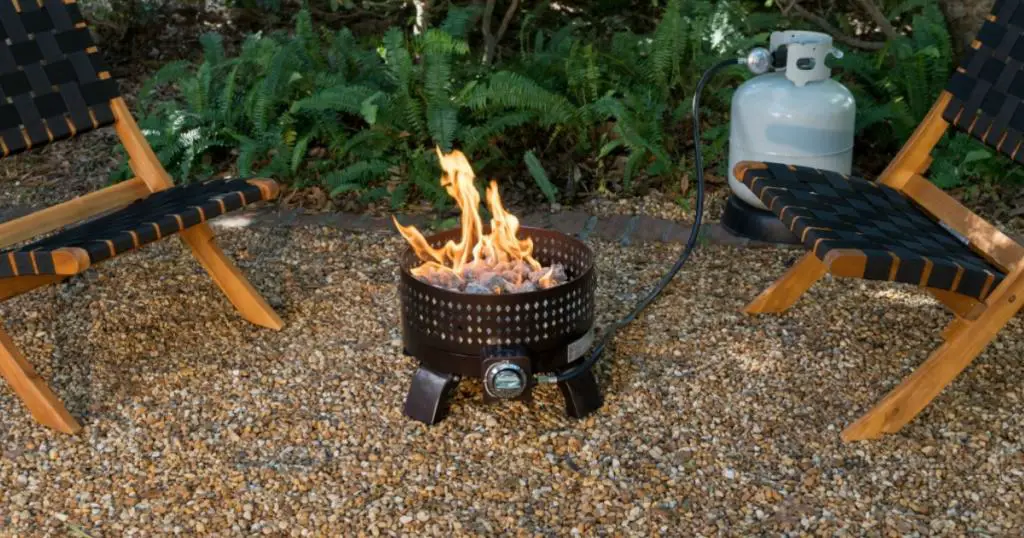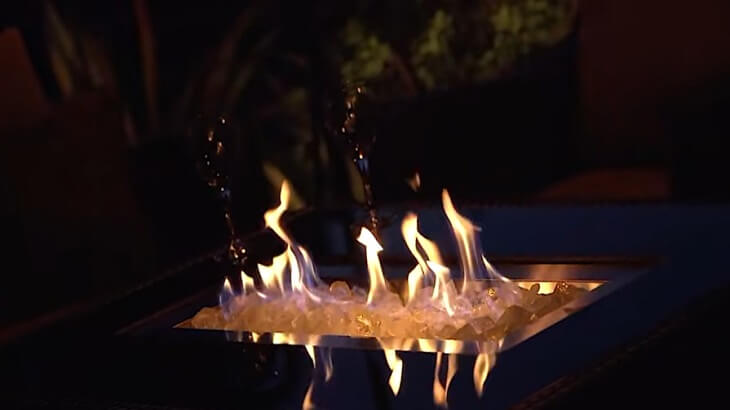Note: This article may contain affiliate links, which means if you make a purchase following our links won’t cost you extra, but we may earn a commission. Learn more
A gas fire pit is a great way to enjoy a fire without all the hassle of wood. But sometimes, your gas fire pit can whistle. Why does this happen and how can you stop it?
There are a few reasons why your gas fire pit might whistle. One reason is that the burner holes are too big. When the flame hits the air, it causes a whistling sound.
Another reason could be that the regulator is set too high. This causes the gas to flow through the pipes too quickly, which also makes a whistling sound. Finally, it could be that there is something blocking the air intake valve.
This could be dirt, leaves, or even insects. If this is the case, simply clean out the valve and make sure it’s clear of any obstructions.
If you have a gas fire pit, you may have noticed that it sometimes emits a high-pitched whistle. This is perfectly normal and usually happens when the weather is cold. The reason for this is that the cold air can cause the gas in the pit to expand, which then causes the whistle sound.

How Do I Stop My Gas Fireplace from Whistling?
If your gas fireplace starts whistling, it may be because the air pressure in the room has changed. This can happen when a door or window is opened, or when the temperature outside changes. The change in pressure causes the air to move through the burner faster, which can create a whistling sound.
There are a few things you can do to stop your fireplace from whistling. First, make sure that all the doors and windows in the room are closed. This will help to stabilize the air pressure in the room. If the whistling persists, you can try adjusting the damper. The damper is located at the top of the fireplace and controls the amount of air that can enter the fireplace. By opening or closing the damper, you can help to regulate the air pressure in the room and stop the whistling.
If you have a gas fireplace insert, you may need to adjust the air intake. The air intake is located on the back of the insert and controls the amount of air that is drawn into the fire. By adjusting the air intake, you can help to stop the whistling sound.
If you have a gas log set, you can also try adjusting the gas pressure. The gas pressure controls the amount of gas that is delivered to the logs. By adjusting the gas pressure, you can help to stop the whistling sound.
If you have an unvented gas fireplace, you may need to have the unit serviced. Unvented fireplaces can build up a lot of pressure over time, which can cause a whistling sound. If you have an unvented gas fireplace, it is important to have it serviced by a qualified technician to ensure that it is operating safely and correctly.
Read More: Does Sunset Beach Have Fire Pits?
How Do I Stop My Fire Pit from Hissing?
If your fire pit is hissing, it’s likely because there’s water in the gas line. This can happen if the gas line isn’t properly sealed or if condensation has built up inside the gas line. To stop your fire pit from hissing, you’ll need to remove the water from the gas line.
One way to do this is to turn off the gas supply and then disconnect the gas line from the fire pit. Once the gas line is disconnected, open up both ends of the gas line and allow any water to drain out. You may also want to use a paper towel or other absorbent material to soak up any remaining water inside the gas line.
Once you’ve removed all of the water from the gas line, you can reconnect it to your fire pit and turn on the gas supply. Your fire pit should now be working properly without any hissing sounds.
Why is My Gas Fireplace Making a High Pitched Noise?
If your gas fireplace is making a high pitched noise, it could be due to a variety of reasons. One possibility is that the pilot light is too close to the burner. The pilot light should be about 1/2 inch away from the burner, and if it’s too close, it can cause a high pitched noise.
Another possibility is that there’s something blocking the air intake for the fireplace. If there’s not enough airflow, it can also cause a high pitched noise. Finally, it could just be that your fireplace is dirty and needs to be cleaned.
Why Does My Propane Fire Pit Make Noise?
If your propane fire pit is making noise, it’s most likely due to one of two things: the burner or the gas line. The burner is the part of the fire pit that actually creates the flames, and it’s usually made of metal. Over time, as the metal expands and contracts with changes in temperature, it can start to make noise.
This is especially true if there’s any dirt or debris build-up on the burner. The other possibility is that your gas line is making noise. This can happen if there’s a leak in the line or if something is blocking the flow of gas.
If you think this might be the case, you should turn off your fire pit and call a certified technician to come to take a look.
Why Does My Fire Pit Create a Whistling Noise?
Gas Fire Pit Loud Gas Flow
If you’re looking for a roaring fire to take the chill off a cool evening, a gas fire pit is probably your best bet. But if you’re not careful, that roaring fire can quickly become a noisy one! A gas fire pit works by igniting a small amount of propane or natural gas in an enclosed space.
The resulting flame is then able to heat up the surrounding air, providing warmth to anyone nearby. However, if too much gas is ignited at once, the resulting flame can be quite large and very loud. To avoid this problem, it’s important to start with just a small amount of gas and gradually increase the flow until the desired size of the flame is reached.

Additionally, make sure that there are no leaks in your gas line before igniting the flame – otherwise, you could end up with an even bigger (and louder) problem on your hands!
Conclusion
If you’ve ever lit a gas fire pit and heard an ear-piercing whistle, you’re not alone. It’s actually a fairly common problem that has an easy fix. The whistle is caused by the gas escaping from the burner through a small hole.
The best way to fix it is to simply cover the hole with a piece of tape or foil.
